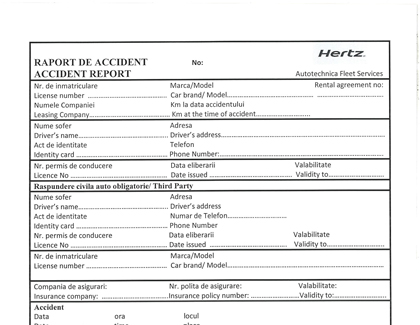
About Hertz
The history of Hertz dates back to 1918, in America when W.L. Jacobs had the innovative idea and established the first car rental office in the world, in Chicago, in the United States of America, purchasing and repairing on his own twelve second hand Ford model T automobiles.
Since then, the Company grew and expanded rapidly, becoming the largest Car Rental in the world and remaining the leader in the car rental market for almost a century now.
In 1961, Hertz established its first office in Athens Greece and in 1974 Autohellas ATEE, has been granted the official franchisee of Hertz for Greece.
Autotechnica Fleet Services was established in Romania by Autohellas ATEE at the beginning of 2007 as a franchisee of HERTZ and within a short period of time became a senior player on the market of Car Rental and Operating Leasing – Fleet Management Services. Hertz Romania (Autotechnica Fleet Services) offers a complete range of services for rent a car on short term, long term, monthly rentals or operational leasing services and fleet management. The fleet in Romania has 2500 cars and covers a wide range of model and group cars. Hertz Romania is one of the rent a car companies with the largest number of locations, present in 3 cities: Bucharest, Cluj- Napoca, Timișoara.
A few words about Autohellas
Autohellas has been active in the automobile sector since 1974 and has been listed on the Athens Stock Exchange since 1999. It is the original company and a member of the larger Th. Vassilakis Group which operates, inter alia, in the air transport industry through the listed company AEGEAN.
The main pillars on which the Group’s activities are based are:
- Rent a Car (Renting and Operating Leasing)
- International activities (Renting and Operating Leasing and Car Sales)
- Car sales (Importing/Distribution/Retail)
It owns the largest private fleet of vehicles, with more than 44,000 vehicles and over 143 sales points in Greece and abroad. The Group provides integrated and innovative services meeting the needs of every customer, at any moment, and it continues to innovate, always offering new services.
As a company specialising in the provision of services, Autohellas places great importance on its human resources, which now numbers over 1,300 people and is at the core of its business.
See a brief history with the most important milestones in Autohellas history.
Vision & Values
The values of Autohellas express its philosophy, reflecting its character and mirroring the best elements in the Group’s long history. They had, have and will continue to have a central role in realising the Autohellas vision in Greece and abroad.
- INTEGRITY: The Autohellas Group acts honestly, it respects its customers’ needs, offers advice, accepts constructive criticism and acknowledges any mistakes or omissions. It demands the highest ethical standards and quality in the services it offers.
- RESPECT FOR PEOPLE: Our people are the driving force behind the Group’s success. Autohellas has always taken pride in treating its staff with respect and dignity, throughout its history.
- HIGH PERFORMANCE: Autohellas always aims at continuously improving its performance, carefully analysing its results and making sure to never compromise its integrity and respect for people.
- TEAMWORK: Teamwork is an integral part of the Group’s corporate culture. This is why Autohellas believes that it is important to share knowledge, ideas and experiences between colleagues in order to strengthen trust.
Corporate Social Responsibility
From the first day it started operating in the Greek market in 1974, the Autohellas Group has strategically chosen to operate in a responsible manner and to take responsibility for the potential impact on all stakeholders affected by its operations. Within this context, actions are systematically undertaken aiming at:
- The operation of the Group with respect for the environment, its employees, customers and suppliers, local communities and government authorities, as well as for the applicable legal and regulatory framework (both nationally and internationally)
- The growth of Greek tourism
- The promotion of the cultural heritage of Greece
- Supporting and promoting sports
- Supporting education
- Supporting vulnerable social groups



























